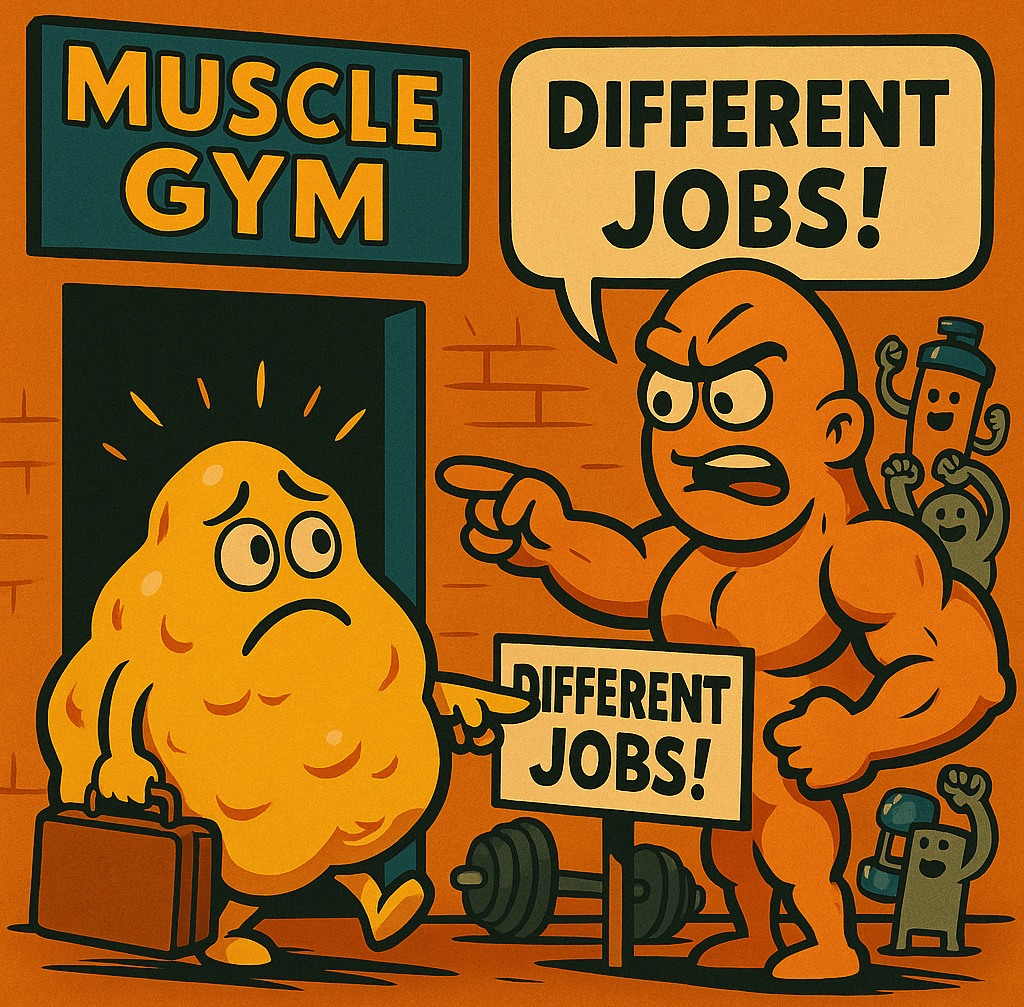Fitness Myth #9: “You Can Turn Fat Into Muscle”
Fat doesn’t magically morph into muscle. They’re different tissues: fat stores energy, muscle moves and burns it. With calorie deficit, resistance training, and enough protein, you can shrink fat and grow muscle — but they never transform into each other.
FITNESS
Adi English
3 min read


💪 Fitness Myth #9: “You Can Turn Fat Into Muscle”
📖 Article (~370 words)
Ah yes, the legendary transformation: one day you’ve got a belly, the next day — boom! — it magically morphs into a six-pack. People talk about fat turning into muscle like it’s some kind of biological Transformer movie. Spoiler: it’s not. Fat doesn’t say, “Yo, I’m tired of being jiggle, I’m gonna be biceps now.”
Here’s the science: fat and muscle are two completely different types of tissue. Fat stores energy. Muscle moves your skeleton, burns calories, and makes you look good in tank tops. They don’t swap jobs. What actually happens when you “lose fat and gain muscle” is that your body composition changes. You burn fat through a calorie deficit, and you build muscle by resistance training plus enough protein. Do both consistently, and you’ll look like you turned fat into muscle — but really, you just lost one and gained the other.
Muscle is built by tension, recovery, and nutrition — not fairy dust. The idea of a cheeseburger deciding to retire from being fat and come back as a quad muscle sounds more plausible.
Another thing: you can build muscle and lose fat at the same time, but it’s tricky. Beginners, people returning to training, or those with a lot of fat to lose see the fastest results, we can call it “newbie magic.” For advanced lifters, it’s slower, but with smart programming, you can still improve both sides.
So no, fat doesn’t morph into muscle. But with strength training, progressive overload, and a diet high in protein, you can shrink the fat and grow the muscle. That illusion of transformation? That’s the real magic trick.
🗂 Vocabulary
Fat – stored body tissue for energy.
Simple: Extra calories your body keeps for later.
Example: Too much fat can affect health.
Student example: ____________
Muscle – tissue that makes the body move.
Simple: What helps you lift and walk.
Example: Muscles grow with training.
Student example: ____________
Energy – power from food or fat.
Simple: What fuels your body.
Example: We burn energy when we exercise.
Student example: ____________
Body composition – the balance of fat and muscle in your body.
Simple: What makes up your body weight.
Example: Two people can weigh the same but have different body composition.
Student example: ____________
Calorie deficit – eating fewer calories than your body burns.
Simple: Eating less than you use.
Example: A calorie deficit makes you lose fat.
Student example: ____________
Resistance training – exercises that make muscles work against weight.
Simple: Lifting or pushing weight.
Example: Resistance training builds strength.
Student example: ____________
Protein – nutrient that builds and repairs muscles.
Simple: Found in meat, eggs, beans.
Example: Protein helps muscles recover.
Student example: ____________
Tension – pressure or stress on muscles.
Simple: Muscles working hard.
Example: Lifting heavy weights creates tension.
Student example: ____________
Recovery – how the body heals after training.
Simple: Rest and food after exercise.
Example: Sleep is important for recovery.
Student example: ____________
Progressive overload – gradually increasing training demands.
Simple: Lifting more over time.
Example: Progressive overload makes muscles grow.
Student example: ____________
📝 Exercises
Comprehension
What do people wrongly believe about fat and muscle?
What are fat and muscle actually made for?
How does body composition change?
Who can build muscle and lose fat fastest?
What role does progressive overload play?
Multiple Choice
Fat stores:
a) Water b) Energy c) Protein d) Oxygen
Muscle helps:
a) Storage b) Movement c) Breathing d) Sleeping
A calorie deficit means:
a) Eating less than you burn b) Eating more protein c) Eating more than you burn d) Sleeping more
Which nutrient is key for muscle building?
a) Protein b) Fiber c) Sugar d) Water
What is “progressive overload”?
a) Running longer b) Eating faster c) Lifting more over time d) Sleeping less
Fill in the Blank
Fat and ______ are two different tissues.
______ makes your body move and burn calories.
A ______ deficit is needed for fat loss.
______ training builds muscle through weight resistance.
The illusion of fat turning into muscle is really changing ______ composition.
True/False
Fat can transform into muscle.
A calorie deficit helps reduce fat.
Resistance training helps build muscle.
Beginners often see fast results.
Recovery is not important for building muscle.
Discussion
Why do you think people believe fat can turn into muscle?
How can someone improve their body composition?
Do you think beginners have an advantage when training?
What’s more important: calorie deficit or protein intake?
How do you practice progressive overload in your workouts?
